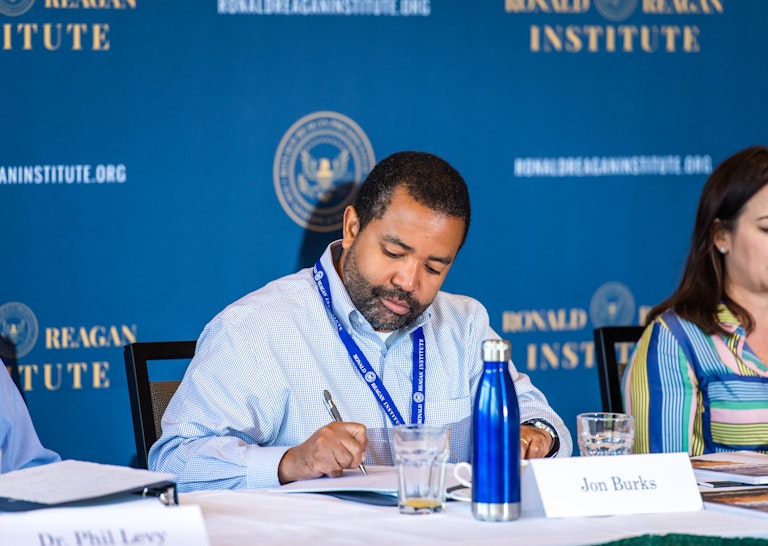Ronald Reagan Institute
The Shifting Tides on Trade
By Jonathan Burks

A Response from Jonathan Burks
As Phil Levy demonstrates in his paper “Is the GOP Still the Party of Free Trade?,” the Republican Party has a long (and complicated) history on trade. While the party since President Reagan has generally advanced liberalized trade, President Trump and his administration have adopted a sharply different approach. But this shift is not merely a peculiarity of the current occupant of the Oval Office. Rather, it reflects what could be a secular change in the party’s approach to trade that reveals underlying changes in the coalition that elects Republicans. The ultimate answer to Levy’s question depends critically, therefore, on whether free-trade Republicans can offer a convincing alternative to an increasingly trade-skeptical Republican electorate.
The New Challenge to Free Trade
In 2009, the Tea Party movement (TPM) emerged as a grassroots conservative reaction to the Great Recession. With both Congress and the presidency controlled by Democrats, the federal government responded to the Great Recession by enacting a massive deficit-financed stimulus bill and by increasing government control over one-sixth of the economy through Obamacare. The TPM rebelled against this centralization of power in Washington by calling for limited government, free markets, lower taxes, and fiscal responsibility. The movement was animated by the sense that the American Dream was in peril because the system was stacked against the average guy and that Democrats were seeking to concentrate even more power in the hands of a remote elite in Washington. Moreover, the TPM manifested a sincere distrust of big institutions, whether it was the government in Washington or the multinational corporations that had driven the economy into the recession.
Contemporary polling showed that among those who identified with the TPM, 63 percent believed that free trade agreements are bad for the United States. This trade pessimism bled into the broader Republican electorate, with support for free trade agreements plummeting from 43 percent in November 2009 to 28 percent in October 2010. When Republicans retook the majority in the House of Representatives in 2010, the new majority consisted of dozens of newly elected officials who self-identified with the TPM. Given the movement’s generally anti-free trade views, it was an open question how these newly elected officials would approach international trade. Surprisingly, a common refrain as these new congressmen assumed office was, “Tariffs are taxes, and I’m for lower taxes.”
But in the first major test on trade policy for this generation of lawmakers—the 2015 Trade Promotion Authority vote—a significant number of stalwarts of the populist Right voted no. Of the 50 Republicans who opposed granting Trade Promotion Authority, almost half were members of the Freedom Caucus,1 which carries the policy agenda of the TPM in Congress. While most of these members couched their votes as opposition to the delegation of additional discretion to President Obama, their votes demonstrated the changed environment with respect to Republican support for trade liberalization.
When Donald Trump brought his economic nationalist trade policy to the 2016 Republican primary, there were already clear signs of an erosion of the post-Reagan Republican consensus on trade. The Trump campaign further eroded support among Republicans for freer trade. Just before the 2016 election, support for free trade among Republicans and Republican-leaning independents bottomed out at 29 percent, 30 percentage points lower than among Democrats. While support for trade among Republicans has rebounded somewhat since then, the divide between generally favorable elite opinion on trade and more skeptical opinion among the Republican base remains.
Making Sense of the New Trade Policy
Given the public opinion landscape within the Republican Party, it’s no surprise that President Trump continues to pursue a more protectionist policy than have other recent Republican presidents. But Trump’s trade policy is not just an opportunistic appeal to an energetic segment of the Republican base. Rather, it reflects President Trump’s long-held view that America has been taken advantage of by our trading partners, that the proof of this is in our trade deficit, and that trade with a rising Asian power poses a particular threat to America’s well-being and security. These elements point toward the underlying logic of Trump’s trade policy and to how Trump is seeking to institutionalize support for his trade policy.
First, Trump has sought “better deals” from our trading partners, many of whom are also our traditional allies. And he has pursued trade policy as a form of industrial policy, trying to protect what he identifies as strategically critical industries, especially heavy manufacturing. At his core, he is motivated by the conviction that heavy manufacturing—e.g., steel, aluminum, and automobiles—is essential not just to economic prosperity but to national strength. In March 2017, Trump explained:
[T]he model that you’ve been watching, the model that’s created so much value, the model of bringing back jobs and bringing back industry—I called it the American model. And this is the system that our Founders wanted. Our greatest American leaders—including George Washington, Hamilton, Jackson, Lincoln—they all agreed that for America to be a strong nation, it must also be a great manufacturing nation.
The Republican platform of 1896—more than a century ago— stated that: “Protection and reciprocity are twin measures of American policy and go hand in hand.” I mean, we have situations where other countries who have zero respect for our country—by the way, did you notice they’re starting to respect us a lot? A lot. A lot. They’ll charge us a hundred-percent tax on some counts. A hundred percent. And we charge them nothing. They’ll make it impossible through regulations for our product to be sold in their country, and yet they’ll sell their product routinely in our country. Not going to happen anymore. The word “reciprocity”—they do it, we do it. Who can complain about that? Big difference. You’re talking about big, big dollars too, by the way.
The platform went on to say: “We renew and emphasize our allegiance to the policy of protection, as the bulwark of American industrial independence and the foundation of American development and prosperity.”
In pursuit of this goal, President Trump has imposed unilateral tariffs to force negotiations and to create leverage for his negotiators. He is convinced tariffs are a win-win proposition. If the negotiations the tariffs provoked result in a new agreement, then the terms of trade have improved for America. And if the negotiations fail, then America’s domestic producers will have a protected market in which to grow.
“The challenge for pro-trade Republicans is to offer an alternative on trade that is strong enough to overcome the antitrade predispositions of a significant part of the Republican electoral coalition…”
It’s this combination of the president’s ideological commitment coupled with the base’s trade suspicions that suggests the change in Republican trade policy may not be an interregnum. This is nowhere clearer than in the response to president’s trade policy with China. In his maiden speech on the Senate floor, Senator Mitt Romney spoke for much of the Republican elite when he explained:
When it was admitted to the World Trade Organization, the expectation was that China would embrace the rules of the global order, including eventually respect for human rights. It has done the opposite—imprisoning millions in reeducation camps, brutally repressing dissent, censoring the media and internet, seizing land and sea that don’t belong to it, and flouting the global rules of free and fair competition.2
The frustration evident in Senator Romney’s remarks is felt across the Republican coalition, on both sides of the aisle, and in growing segments of the business community. Rather than opening its economy to foreign investment, opening its markets to foreign goods and services, reducing subsidies to industry, cracking down on the theft of intellectual property, allowing its currency’s value to be determined by the market, or any other of a long list of market liberalizations that were expected, China has pursued an industrial policy seemingly purpose-built to drive international competitors out of business and establish market power for its national champions. When President Trump imposes punitive tariffs on China’s exports or bans their companies from potentially sensitive telecommunications systems, he appeals not just to the base, but to the probusiness and national-security-focused parts of the Republican coalition as well. The results from his approach to China, however, have not produced better results than the less confrontational approach of prior administrations. And these tariffs are costly. American consumers and industry face higher costs for imported goods. American exporters, especially in agriculture, have lost sales as their customers have walked away or seen their price to consumers rise under retaliatory tariffs. Moreover, his antagonistic approach to America’s putative allies has encouraged those countries to seek separate accommodations with China.
Conclusion
The challenge for pro-trade Republicans is to offer an alternative on trade that is strong enough to overcome the antitrade predispositions of a significant part of the Republican electoral coalition and to address the legitimate concerns of business-focused and national-security-focused Republicans as well. This case will have to answer the charges leveled by President Trump as to how manufacturing (and manufacturing jobs) fit into our economy and how to handle trade with an immensely populous nation that seems intent on pursuing a mercantilist trade policy to the detriment of the United States. The fact remains that open market strategies—at home and abroad—are the best means to generate broad-based domestic prosperity, but we cannot rest simply because the facts are on our side.
"The Future of Conservative Internationalism," which is a collection of essays from the Reagan Institute Strategy Group, convened in Beaver Creek, Colorado, in July 2019.
U.S. House of Representatives, Roll Call Vote #374, June 18, 2015.
Senator Mitt Romney, “Maiden Speech,” June 4, 2019, Congressional Record, p. S3175.
Join Our Newsletter
Never miss an update.
Get the latest news, events, publications, and more from the Reagan Institute delivered right to your inbox.
